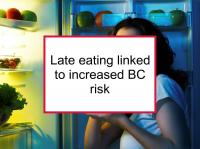Recent evidence suggests that the frequency and timing of eating influences metabolic health. Fasting longer at night and reducing evening calorie intake have both been shown to be associated with reduced improved glycemic control and reduced inflammation (as measured by C-reactive protein (CRP)), thereby reducing breast cancer risk.
Avoiding night time eating also appears to improve breast cancer-specific survival. One study reported that nightly fasting periods of at least 13 hours was associated with significantly reduced breast cancer mortality. Now a new study has reported that night time consumption of meals or snacks not consisting of fruits or vegetables is linked to increased breast cancer risk among normal weight women.
Latest research finds late night eating linked to breast cancer
The case-control study referenced above was designed to investigate the association between night time eating habits and risk of breast cancer in Hong Kong women. The study, which took place between 2012 and 2015, included 922 breast cancer patients and 913 cancer-free women who served as controls. The women were interviewed using a questionnaire concerning eating behavior during both day and night, including types and frequencies of food intake.
Eating after 10 pm was found to be associated with 1.50 times the breast cancer risk compared to not eating after 10 pm. The risk was higher among women who had the longest duration of night time eating (2.28 x the risk for ≥20 years) or who ate especially late ( 2.73 x for midnight to 2 a.m.). However, night time eating was associated with increased breast cancer among women who consumed staple foods (2.16 x) but not those who ate vegetables or fruits at night.
In addition, the significant association between night time eating and breast cancer was observed among women who were underweight or normal weight (with BMI < 25) but not among women who were overweight or obese (BMI ≥25).
The authors conclude that there is a possible association between night time eating behavior and risk of breast cancer. These results need to be confirmed by independent large studies, according to the authors.
